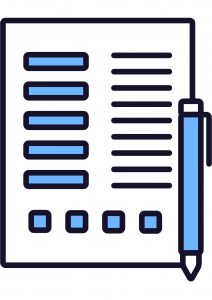Just like it only takes a couple of seconds to get a first impression of a person, a CV is no different. That is why it is so important to have a great CV that stands out from the crowd! A CV (or Lebenslauf in German), is your way of advertising yourself on the job market. However, in contrast to many other countries and continents, a German CV is merely a factual document. That’s right, you should list your experience, skills, and education free from embellishment or buzzwords. So instead of making it a sales pitch, Germans like to let the facts speak for themselves. Which is why we have come up with this CV guide for getting a job in Germany. By formatting your CV according to this guide, German employers will recognise it better, giving you the best chance of landing the job!
If you are interested in finding a job in Germany, check out our webpage Moyyn.com. Moyyn is an engineering and software recruitment agency for highly skilled professionals, currently also having marketing/sales roles, executive, VP positions and more. We matchmake companies with verified and experienced candidates quickly. And the best part? No cover letter needed! So make sure you check out this CV guide for getting a job in Germany, and then upload it to our platform. Not sure if the expat life is for you? Check out our blog post on how international experience can boost your CV. Moyyn will take care of all relocation related processes like visa, accommodation and bureaucratic processes after your arrival.
Now, let’s get to it! Even though there is no one-size-fits-all type of CV in Germany, they most likely tend to follow this kind of structure:
1. Personal information
 Here you will list your personal details and how they can reach you.
Here you will list your personal details and how they can reach you.
- First and last name
- Date of birth
- Nationality
- Contact information
- Professional photo (if you only have selfies you might as well not include one)
- A short description of yourself and your skills
2. Education
Here you will list all your education, both secondary and higher education. Start with the most recent and then work your way down to the beginning of your education. It’s important that you include both the name of the university you attended, as well as the programme you graduated from. You should also include when you started and finished the education, or if it is still ongoing. If you want, you can also include certain areas or modules of the degree programme that you did, if you think it’s relevant for the position you are applying for. Most applications nowadays also give you the option of uploading your transcripts of record, proving your educational background.
3. Work experience
Just like your education, you should list all your previous work in a reverse chronological order. For each job you had, it’s important to name the company, the title of your position, which dates you worked there, and the key responsibilities. While still sticking to the facts, you can also include any achievements you made during your work. Especially if the position or achievement in that position is relevant for the job you are applying for. If you have been on the job market for a longer time, and have held quite a few positions, it’s ok to include only the last 10-15 years or so. If you e.g. are applying for head of IT, it is not relevant that you worked in the ice cream stand 40 years ago.
4. Other merits
In this section you can list other skills or qualifications that you think are relevant for the position. Maybe you did a few seminars in some specific computer skills? Or you speak 5 languages? Whatever achievements or certifications that will make you stand out from the rest, and which will help you land the job. For example, being fluent in German might be a huge advantage in this case. However, while it’s common in other countries, German CVs normally don’t include hobbies or personal interests. It is simply not considered relevant by most hiring managers. Unless, say you are the team captain or a world-winning team. That on the other hand is a hobby which proves you have leadership skills!
5. General CV tips
- Stick to the facts – sugar-coating is not for the German job market
- Only list experience and skills which are relevant
- Keep it short – no longer than 2 pages
- Make it visually appealing – only use one font, avoiding bold, underlined or dense writing
- Bullet points rather than long paragraphs – make it easy to read!
- Make it personal – adjusting your CV depending on the position
- Always check for typos or bad grammar – there is nothing worse than bad writing
We hope this CV guide for getting a job in Germany was helpful. Moyyn is an AI based recruiting platform that will match companies to highly skilled professionals across the globe. Join our talent pool for free and let our AI find you the perfect job! Candidates apply once to the platform, submit their CV and get verified. No cover letter needed! Selected candidates will be shared with the partner companies and they contact the candidates for interviews directly.
As Moyyn specializes in international recruitment, we provide companies with the right talent from around the world. Once you have been selected, Moyyn will take care of all relocation related processes like visa, accommodation and bureaucratic processes after your arrival. Yes, you can get full relocation support for your international experience! We have more than 1200+ relocation experts in our network and have supported 1000 international employees in various processes until now. So what are you waiting for? Sign up for our talent pool now!

